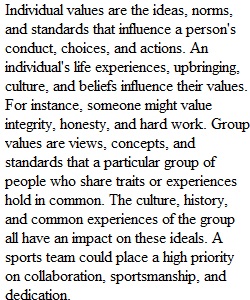


Q The 7C's of Social Change were explored in the reading and also in the documentary you watched. Your assignment due at the end of this module is to write a reflective narrative in which you discuss the following: 1. Explain the differences between individual values, group values, and society/community values. 2. List the 7Cs embodied by the leader you watched in the documentary. Include the name of the leader and title of the documentary you selected. If you selected your own documentary per Part II lesson directions, please include a link to your documentary and the length (must be 30 minutes or more). 3. Relate the 7Cs to the service-learning issue you've chosen and support your responses with evidence connected to that service-learning issue and the individual, group, and society/community values inherent in it. Before you start writing, you can see the implementation of these elements here at UCF in the area of social change. As you write your reflective paper, keep in mind • The needs of the community that should be addressed • What has been done or can be done to address these needs • The resources that are needed to make change happen Local examples of Social Change Model at UCF include: 1. Sustainability Projects 2. Knights Helping Knights Pantry (https://www.ucf.edu/services/s/food-pantry/) for more information 3. UCF research on reducing light pollution to protect endangered sea turtlesLinks to an external site. 4. Final Exam Study DayLinks to an external site. Other examples of Social Change Initiatives include Civic Groups • Rotary Club • Lions Club • Homeowners Associations/Boards • Alumni Associations • Non-profit Boards • Faith Based Groups • Senior Corps PreviousNext
View Related Questions